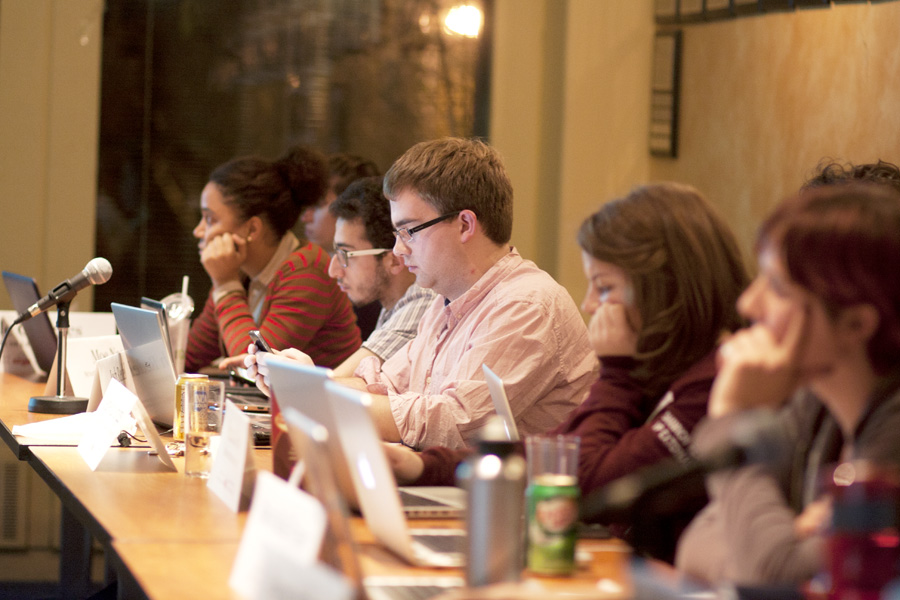Last Thursday, SSMU Legislative Council passed a motion to endorse a referendum question that would increase the fee levy for the McGill Student Emergency Response Team (M-SERT), but did not endorse a question on Radio CKUT’s fee increase.
Councillors also discussed the four nonbinding motions passed by the Oct. 15 SSMU General Assembly (GA) after losing quorum.
The vote to endorse CKUT’s question—which asks for a $1 increase in its opt-outable fee—fell short of the required majority, with 11 councillors for, 11 against, and four abstentions.
CKUT is a non-profit campus-community radio station based on the McGill campus. According to SSMU Vice-President Clubs and Services Allison Cooper, an endorsement of CKUT’s referendum question could help raise student awareness of the radio station’s status as a student group.

“I think it’s an important way for Council to help students navigate these confusing bureaucratic channels by lending legitimacy to questions that many students may not understand SSMU’s relevance to,” Cooper later told the Tribune.
Other councillors expressed concern over endorsing CKUT, even though a ‘No’ committee has yet to be formed for the question.
“Clearly some students feel one way and some feel the other way,” SSMU Vice-President Internal Michael Szpejda said. “So if we are picking one way, I don’t see how we are representing all of our constituents.”
Council decided to pass M-SERT’s motion after many councillors expressed their support. M-SERT is a student-run first aid service that provides emergency response in residences and on campus. M-SERT’s referendum question asks for a $0.50 increase in its fee.
“M-SERT is super important on this campus,” SSMU Clubs and Services Representative Zachary Rosentzveig said. “[The service] literally saves lives … they do amazing work with very little money.”
President Josh Redel pointed to the fact that M-SERT, unlike CKUT, is a SSMU service rather than an independent student group, and reminded Council that SSMU has a policy stating that clubs and services are the society’s highest priority.
Council also passed two out of four nonbinding GA motions, which were tabled at the last Council meeting due to a lack of clarity in SSMU’s by-laws. The by-laws in question dealt with the online ratification process for GA motions, which SSMU introduced this semester.
While the two motions passed when the GA had quorum went automatically to an online vote, the by-laws were not clear as to whether Council should treat the four nonbinding motions as GA motions—which are subject to online ratification—or as Council motions.

Redel explained that the Steering Committee decided that the GA motions should be treated as Council motions, with the results deemed binding following a Council vote. Ratification of motions voted on by Council violate SSMU’s governing documents because Council would then assume the role of the GA.
Discussing the GA motions as Council motions allowed the vote to be binding, while including time for debate and amendments if necessary.
“[The] Steering Committee does recommend that Council operate under the direction that the consultative forum took on each motion … but we do welcome and encourage debate on the motions to help make them stronger, more powerful motions from Council,” Redel said.
Council passed the motion regarding SSMU’s support for accessible education and its opposition to the further development of the Canadian oil sands.
Council then tabled a motion regarding its opposition to Canadian military involvement in Iran, and a motion regarding opposition to Plan Nord. Some councillors suggested that a lack of knowledge made them more hesitant to take a stance on issues external to SSMU.
“I find it kind of bizarre that we are not provided with external information that is supposed to support these motions,” Arts Representative Nicole Georges said. “The point of our responsibility is to vote on motions that affect the student body as a whole, and yet we are being asked to do this with a tiny bit of knowledge. This seems to be very irresponsible and reckless.”
However, Arts Representative Claire Stewart-Kanigan disagreed with Georges’ concerns.
“There is no reason why you cannot go out and do this research yourself,” Stewart-Kanigan said. “We get these motions ahead of time … That’s your responsibility as a councillor.”
Council also passed a motion about creating a trial run for the Student Advocacy Resource Committee until March 2013. This committee, based on a group formerly known as the Independent Student Advocacy Service, is designed to help SSMU members access information and support to help effect change on campus through advocacy campaigns, research, and co-ordination with elected representatives.
Additionally, Council passed a motion regarding work on the upcoming McGill education summit. The motion mandates that SSMU will produce a document by the end of the semester after broad consultation with students and faculty student associations on the subject of education.









